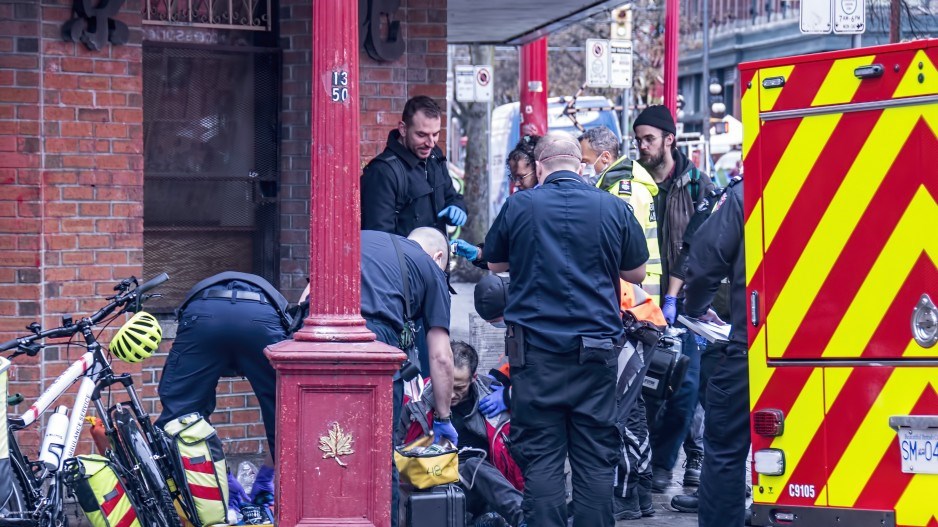Only three of the 89 local health areas across the province — Fernie, Kimberley and Kootenay Lake — did not register a toxic drug overdose death in 2022, according to a spreadsheet obtained under freedom of information law.
Almost 40 per cent of B.C.’s 2,314 overdose deaths in 2022, the deadliest year on record, occurred in five local health areas, according to BC Coroners Service (BCCS) figures. Thirty-eight local health areas had between one and 10 fatalities.
B.C. declared a public health emergency seven years ago, following a significant increase in drug-related overdoses and deaths.
Since then, at least 11,807 people have died as a result of unregulated drugs. It is the leading cause of unnatural death in B.C., more than murder, suicide, motor vehicle crashes, drownings and fire deaths combined.
Vancouver-Centre North, which includes the Downtown Eastside, was the deadliest area in 2022, at 319 fatalities, followed by Fraser South (Surrey) (216), Greater Victoria (133) and Vancouver-City Centre (104).
Kamloops (96), Central Okanagan (92), Abbotsford (88), Prince George (84), Greater Nanaimo (80) and Burnaby (68) round out the top 10 local health areas to register the most overdose deaths last year.
The remaining City of Vancouver local health areas include: Vancouver-Midtown (47), Vancouver-South (38), Vancouver-Northeast (38) and Vancouver-Westside (seven).
A reporter had applied for a spreadsheet of statistics based on the first three characters of the postal code where each fatality occurred, but was advised that BCCS maintains a “small number policy to limit any risk of re-identification of individuals.”
“For small geographic areas, such as the municipality or first three characters of the postal code, the risk of re-identification can be high in areas where there are few deaths,” said the response from the government’s information access operations department on behalf of BCCS.
BCCS also said it is unable to report by community health service area because its system does not record at that level, so it relies on local health area figures.
Under that “small number policy,” BCCS suppressed the statistics for eight local health areas. No figures were provided for Bella Coola Valley, Central Coast, Fort Nelson, Nisga’a, Stikine and Snow Country, Telegraph Creek, Upper Stein, and Vancouver Island West.
The 38 areas that saw between one and 10 fatalities in 2022 included Prince Rupert and Cowichan Valley North and West (10); Powell River and Sunshine Coast (9), West Vancouver/Bowen Island (5), Haida Gwaii and Howe Sound (2); and Windermere (1).
For January 2023, BCCS suppressed figures for 43 local health areas.
Vancouver had 61 overdose deaths in the first month of the year, but the BCCS said it was unable to separate fatalities by local health area. Surrey (24), Greater Nanaimo (13), Greater Victoria (11) and Central Okanagan (80) had the next-highest overdose numbers in January.
Nine local health areas recorded no deaths in the first month of 2023, including South Surrey/White Rock, Sunshine Coast and West Vancouver/Bowen Island.
January to March of this year had the second-highest number of overdose deaths on record for a first-quarter period. The 596 fatalities registered provincewide in Q1 2023 came close to the 2022 record of 599 overdose deaths.
During February and March – the first two months of B.C.’s hard drugs decriminalization trial – 374 deaths occurred, at a rate of 6.4 per day.
Of those who died of a toxic drug overdose in the first quarter of 2023, 71 per cent were between ages 30 and 59, and 77 per cent of the victims were male.
This article is part of an in-depth, provincewide journalistic effort by Glacier Media to examine the scope, costs and toll of the opioid and toxic drug crisis in British Columbia – a public health emergency that has taken at least 11,807 lives since 2016.
If you or someone you know is in an emergency, call 911. If you need help with substance abuse, call the B.C. government's alcohol and drug information and referral service at 1-800-663-1441. It's available 24 hours a day.




